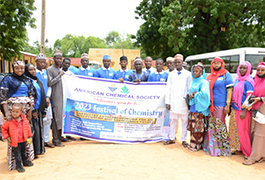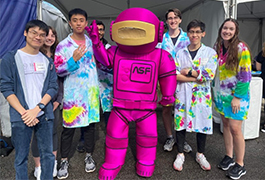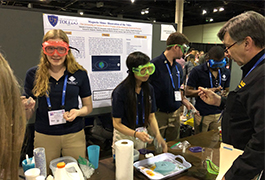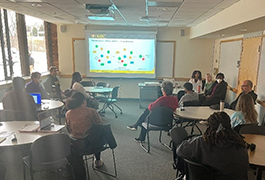9 Ways to Recruit Student Chapter Members—and Keep Them
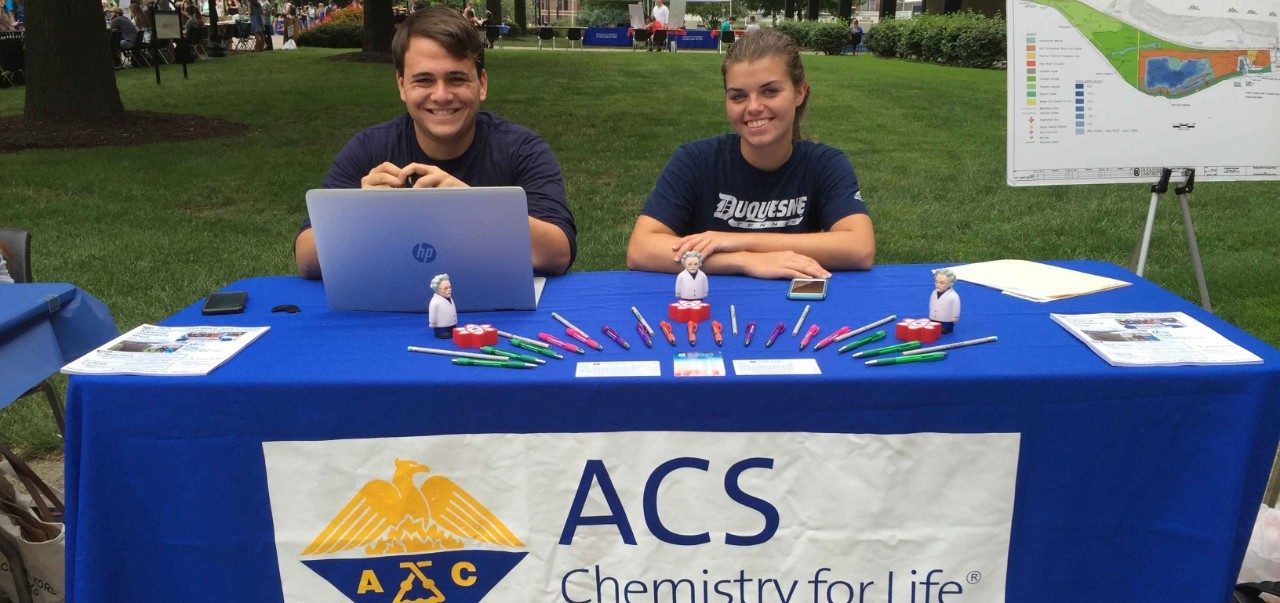
One of the toughest parts of having an ACS student chapter is recruiting and retaining members. Volunteer activities are often pushed aside when coursework, jobs, and other immediate demands start piling up. If you’re having trouble attracting new members or keeping people motivated to stick around, have no fear! ACS’s 9200 Chemistry Ambassadors combined their expertise on successful ways to recruit and retain volunteers for community outreach that will help you keep your members engaged.
1. Know your people
To get volunteers, it is important to understand why people volunteer. Some volunteer because they enjoy serving their communities. Some people are looking for professional development opportunities. Others may simply love public accolades.
Take time to learn why students at your school might be interested in a chemistry-focused activity, and develop a recruitment plan based on your findings.
2. Peddle the advantages
Many students need to build résumés and some of your peers are in degree programs that require professional development units (PDUs) or community service hours to graduate. In the state of West Virginia, for example, education majors must complete PDUs to graduate, and, to meet their requirements, some students serve in community organizations that promote science. You can expand participation in your chapter by bringing in recruits who will benefit personally from your community service projects—even students majoring in a discipline outside of chemistry.
You can emphasize the professional development experience they can get from organizing an outreach activity and participating in chapter events. Students build leadership and grant-writing skills, and they get experience in fundraising. Chapter members also develop communication, networking, and public speaking skills by presenting at ACS meetings. These valuable experiences are excellent for résumés, job interviews, and being a great performer when you do land your first job or internship.
3. Tap ACS assistance
Even the most engaged volunteers can feel burdened with the task of creating activities from scratch. Fortunately, ACS has some great resources for volunteers to get the ball rolling. National Chemistry Week and Chemists Celebrate Earth Week are two well established programs that provide support and guidance for students looking to begin their outreach activities. Additionally, the ACS store has tools that make promoting science in the classroom efficient and fun. Check out the classroom kits that cover such topics as color and light. These kits come with all the supplies, age-appropriate background information and worksheets that can be shared with outreach participants.
4. Alleviate fears
The unknown can be scary. Joining a chapter or supporting an event can be daunting if you don’t know exactly what you are committing to. Alleviate this fear by assigning specific, clearly defined tasks and offering training to help volunteers fulfill responsibilities. If you find that students are intimidated by working with children or people with non-science backgrounds, pair them with more experienced volunteers. People tend to feel less pressure when they are supported by peers. You can also try one-on-one mentoring to help students blossom.
5. Food, food, food
Free food is a great way to bring people together. It doesn’t have to be fancy—pizza, snacks, or even a potluck will work. Not only will food attract volunteers, it will also make meetings more casual and enjoyable and help members feel connected.
6. Communication + positive feedback = strength
Provide a pathway for clear communication and feedback. Volunteers need to know what they did well and how they can improve interactions with audiences. Positive feedback may come from peers, clients, via social media, or personal communication with a mentor. You can base feedback on pre- and post-tests and surveys from event participants or your own observations.
7. R.E.S.P.E.C.T.
Student chapter leaders should be respectful of their volunteers’ time. With all the commitments that students have, some of your members can be stretched thin. Look for activities that require minimal prep time, such as making slime, tie-dyeing shirts, or career day presentations. Adding a chemistry booth to events organized by others (career fairs, carnivals, or other community events) is one way to minimize the volunteer workload while still providing an outreach opportunity for chapter members.
8. Create professional experiences
Support your volunteers in ways that help them build their careers. Such experiences can include covering the travel costs to attend ACS meetings or providing them with opportunities to attend workshops that help build their skills and knowledge. The ACS Leadership Institute has many workshops that build leadership skills as well as ways to recruit volunteers.
9. Show appreciation
People want to feel appreciated, and when they feel appreciated, they are more motivated. That’s why recognizing volunteers is very important. Be sure to thank everyone who volunteers after every activity. You can also celebrate your successes with an end-of-the-year potluck party and recognize exceptional volunteers with a “Volunteer of the Year” ”Chemistry Ambassador” award. Does appreciation matter? Of course! Research has shown that volunteers have a 27% higher chance of finding employment after being out of work than non-volunteers.



